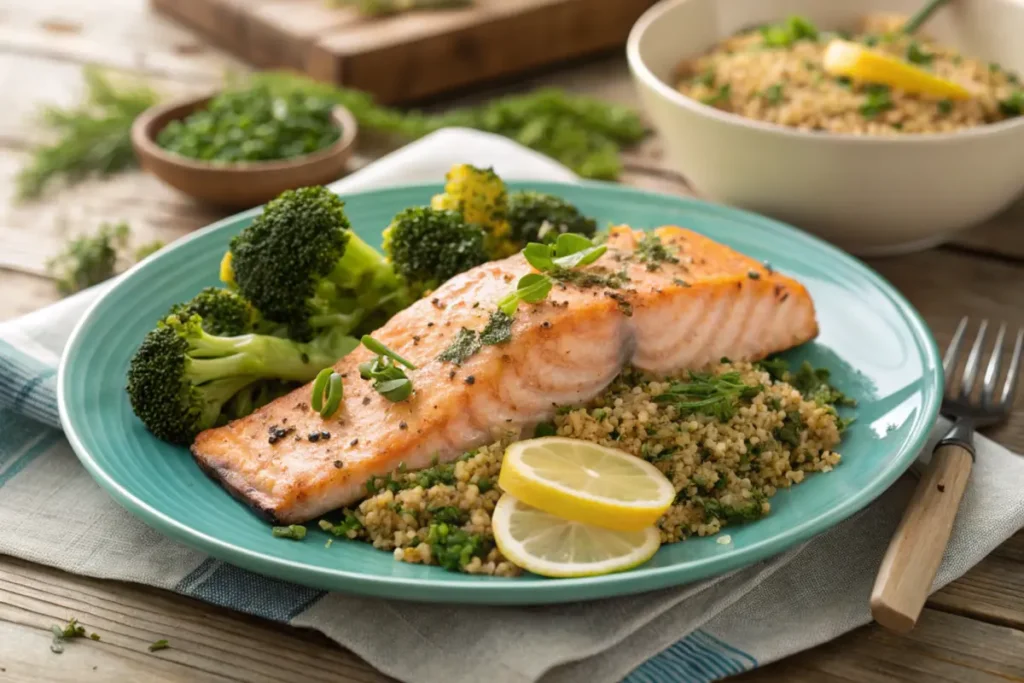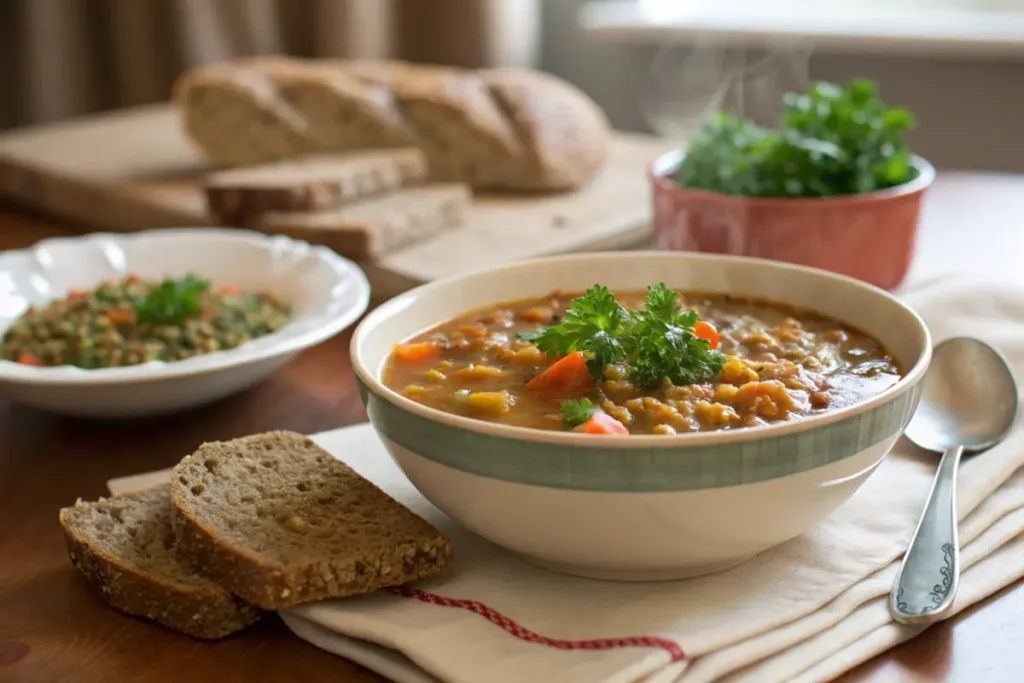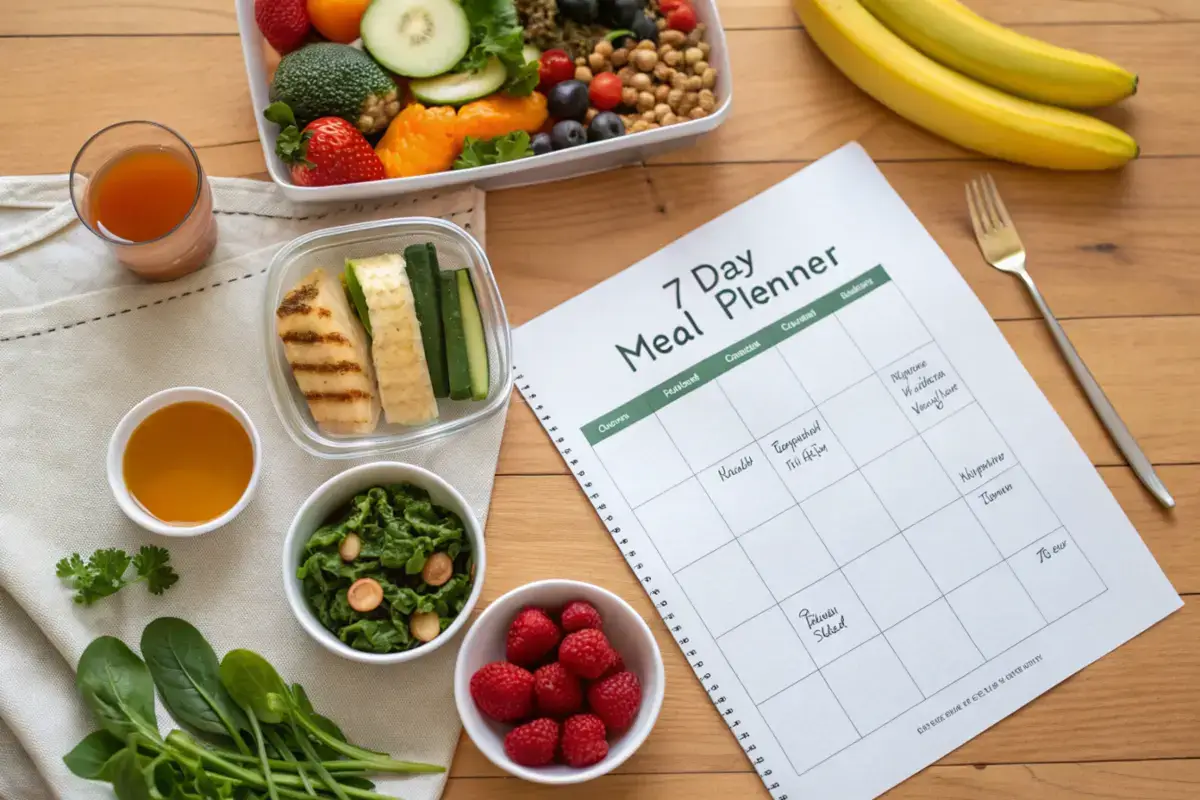Managing pancreatitis can feel overwhelming, especially when it comes to deciding what to eat. A carefully crafted 7-day meal plan for pancreatitis can ease symptoms, promote healing, and restore your digestive health. This guide explores the role of nutrition in pancreatitis, provides practical dietary tips, and introduces a week-long meal plan designed to keep you nourished while managing this condition.
From understanding the essentials of a pancreas-friendly diet to trying out delicious recipes, we’ve got everything you need to take control of your health. Let’s dive in!
Understanding Pancreatitis and the Role of Diet
What is Pancreatitis?
Pancreatitis is the inflammation of the pancreas, a vital organ that helps in digestion and regulates blood sugar. The condition may be acute, causing sudden and severe symptoms, or chronic, developing over time with recurring flare-ups. Common causes include gallstones, alcohol abuse, and certain medications.
The symptoms range from abdominal pain and nausea to digestive difficulties. Left unchecked, pancreatitis can lead to complications, making early intervention crucial.
Why a Meal Plan is Crucial for Pancreatitis Recovery
Diet plays a starring role in managing pancreatitis. A well-thought-out meal plan not only reduces strain on the pancreas but also minimizes symptoms like pain and indigestion.
Foods to Include:
- Low-fat options like lean proteins (e.g., chicken breast, tofu).
- Anti-inflammatory foods such as fruits, vegetables, and whole grains.
- Easily digestible carbohydrates like oatmeal and rice.
Foods to Avoid:
- High-fat and fried foods.
- Processed snacks and sugary beverages.
- Alcohol and caffeinated drinks.
A structured meal plan ensures consistent nutrient intake, which aids in recovery. It also helps you steer clear of triggers, making daily decisions easier.
By focusing on low-fat diets and anti-inflammatory ingredients, a 7-day meal plan for pancreatitis can serve as your roadmap to better health. Next, we’ll delve deeper into the specific dietary guidelines that lay the foundation for this healing journey.
Key Nutritional Guidelines for a Pancreatitis-Friendly Diet
Macronutrients and Their Importance
When managing pancreatitis, keeping your meals low in fat is critical. Fat puts extra pressure on the pancreas, potentially worsening symptoms. Instead, focus on lean proteins such as chicken breast, fish, and plant-based options like tofu or legumes. These proteins provide essential nutrients while being easy on digestion.
Carbohydrates also play a key role in energy production. Opt for whole grains like oatmeal and brown rice, which are gentle on your system and packed with fiber. Avoid highly processed carbs as they can lead to unnecessary sugar spikes.
Essential Vitamins and Minerals
Anti-inflammatory foods rich in antioxidants can help soothe the pancreas and aid in recovery. Incorporate vibrant fruits like blueberries, cherries, and oranges, which are excellent sources of vitamins A and C. Green, leafy vegetables such as spinach and kale also offer a healthy dose of essential nutrients and fiber.
Proper hydration is equally important. Sipping water throughout the day supports digestion and helps prevent dehydration—a common concern for pancreatitis patients. Herbal teas, clear broths, and coconut water are excellent low-fat options to include in your 7-day meal plan for pancreatitis.
For additional tips on low-fat meal preparation, explore TopFitnessMeals’ healthy dinner recipes.
7-Day Meal Plan Overview

Day 1-2: Transitioning to a Low-Fat Diet
Your first two days should prioritize light, easily digestible meals. Think broths and steamed vegetables paired with lean proteins. A simple breakfast might include oatmeal topped with fresh berries. For lunch, try a chicken and vegetable soup. Dinner could feature baked fish with steamed spinach.
Snack ideas:
- A small handful of almonds (if tolerated).
- Low-fat yogurt with a drizzle of honey.
Day 3-5: Gradual Introduction of Variety
As your body adjusts, you can introduce more variety. For breakfast, opt for whole grain toast with avocado slices. A hearty vegetable and lentil stew makes a perfect lunch, while dinner can include grilled chicken with roasted sweet potatoes.
Snack ideas:
- A banana or apple with almond butter.
- Rice cakes topped with hummus.
Day 6-7: Building a Sustainable Routine
In the final days of your 7-day meal plan for pancreatitis, balance is key. Breakfast might include a smoothie with spinach, banana, and almond milk. Lunch can be a quinoa salad with mixed greens, and dinner might consist of turkey meatballs with zucchini noodles.
Snack ideas:
- Carrot sticks with low-fat ranch dip.
- A homemade fruit popsicle for a refreshing treat.
For more inspiration, explore these healthy meal prep ideas.
By following these guidelines, you’ll be on your way to managing pancreatitis effectively while enjoying flavorful and nourishing meals.
Sample Recipes for a 7-Day Meal Plan for Pancreatitis
Breakfast Recipes
Start your day with easy-to-digest meals that are gentle on your pancreas but still flavorful.
- Blueberry Banana Smoothie
Blend together a cup of almond milk, half a banana, a handful of blueberries, and a teaspoon of flaxseeds. This smoothie is packed with antioxidants and fiber to support your recovery. - Low-Fat Oatmeal with Apples
Cook oatmeal in water or almond milk, then top it with thinly sliced apples, a sprinkle of cinnamon, and a dash of honey. Avoid adding butter or cream to keep it low-fat.
For more healthy breakfast ideas, check out TopFitnessMeals’ quick breakfast recipes.
Lunch and Dinner Recipes

Lunch and dinner should include a balance of lean protein, healthy carbs, and vegetables.
- Baked Lemon Herb Salmon
Season a salmon fillet with lemon juice, garlic powder, and parsley. Bake it at 375°F (190°C) for 15–20 minutes. Serve with steamed broccoli and quinoa for a complete meal. - Vegetable Lentil Soup
Combine lentils, carrots, celery, and spinach with low-sodium vegetable broth. Let it simmer until the lentils are tender. This hearty soup is nutritious and soothing.
Snack and Dessert Options
Small, healthy snacks keep your energy steady throughout the day.
- Carrot Sticks with Hummus
Slice fresh carrots and pair them with a low-fat hummus dip for a quick, satisfying snack. - Frozen Yogurt Bark with Berries
Spread low-fat yogurt on a baking tray, top with fresh berries, and freeze until solid. Break into pieces for a refreshing dessert.
For additional inspiration, explore healthy snack recipes on TopFitnessMeals.
Lifestyle Tips for Managing Pancreatitis Through Diet
Meal Preparation and Portion Control
Preparing your meals ahead of time can help you stick to a 7 day meal plan for pancreatitis. Batch cooking soups, grilled proteins, and roasted vegetables makes it easier to grab a healthy option when you’re short on time.
Portion control is equally important. Large meals can overwhelm your digestive system, so aim to eat smaller, more frequent meals throughout the day. Dividing your meals into 4–6 portions can reduce strain on your pancreas and keep you satisfied.
Avoiding Common Pitfalls
There are some hidden traps that can derail your progress. Always read labels carefully to avoid high-fat ingredients, added sugars, and artificial additives. Even items marketed as “healthy” may contain unnecessary fats or irritants.
Additionally, resist the urge to skip meals, as this can lead to overeating later. A consistent eating schedule ensures your pancreas has time to recover between meals.
For more tips on meal preparation and healthy eating, browse the healthy recipes section on TopFitnessMeals.
By following these lifestyle changes and incorporating the recipes into your routine, you’ll find it easier to manage pancreatitis while enjoying flavorful and nutritious meals.
Frequently Asked Questions (FAQs)
What Foods Should I Strictly Avoid?
When following a 7 day meal plan for pancreatitis, steer clear of high-fat and fried foods like butter, cream, and fast food. These can worsen inflammation and cause flare-ups. Alcohol is also a big no-no, as it can put significant stress on your pancreas. Similarly, avoid sugary snacks and carbonated drinks, which can lead to digestive discomfort.
Can I Eat Out While Following a Pancreatitis Meal Plan?
Yes, but it requires extra caution. Opt for dishes that are grilled, steamed, or baked, and request sauces or dressings on the side to control fat content. Sticking to simple preparations, like a grilled chicken salad or steamed vegetables with lean protein, can help you stay on track.
How Long Should I Follow a Specialized Diet?
The duration of your specialized diet depends on the severity of your pancreatitis. For acute cases, a low-fat diet might be necessary for several weeks. For chronic conditions, lifelong adjustments may be required. Consulting with a healthcare provider can help you tailor your plan.
What Role Does Exercise Play in Pancreatitis Recovery?
Light to moderate exercise, such as walking or yoga, can support your overall health. However, during active flare-ups, it’s best to rest and prioritize healing.
Conclusion and Final Tips
A well-crafted 7 day meal plan for pancreatitis isn’t just about managing symptoms—it’s about nourishing your body while protecting your pancreas. By focusing on low-fat, nutrient-rich foods and practicing portion control, you can ease inflammation and reduce discomfort.
Remember, recovery is a journey. It’s okay to experiment with recipes and adjust your meal plan based on your tolerance. Small changes, like swapping high-fat snacks for fruits or choosing grilled instead of fried, can make a big difference over time.
For ongoing support, ensure you stay hydrated, avoid skipping meals, and continue to monitor your symptoms closely. It’s also helpful to keep a food diary to track what works for you and identify potential triggers.
For additional recipe inspiration and tips, visit the healthy eating section on your favorite websites or explore specific meal ideas tailored to digestive health.
Benefits of Following a 7-Day Meal Plan for Pancreatitis
Improved Symptom Management
A carefully designed 7 day meal plan for pancreatitis can significantly reduce symptoms like pain, bloating, and indigestion. By focusing on low-fat and nutrient-rich foods, you minimize stress on the pancreas, allowing it to heal more effectively. Small, balanced meals also help stabilize blood sugar levels, which is crucial for those with chronic pancreatitis.
Moreover, sticking to a structured plan ensures that you avoid potential triggers. Foods high in fat, for instance, can cause flare-ups, while processed sugars can lead to energy crashes. A meal plan keeps these at bay, providing consistency in your diet.
Enhanced Overall Health
Beyond symptom relief, following a structured plan can improve your overall well-being. A diet rich in fruits, vegetables, lean proteins, and whole grains boosts your immune system and supports better digestion. It also promotes a healthier weight, which reduces the risk of additional complications.
Adopting a 7 day meal plan for pancreatitis can also inspire long-term habits. By learning to prepare balanced meals and understanding how food affects your body, you set the stage for lasting lifestyle improvements. Whether you’re dealing with acute or chronic pancreatitis, these benefits make a meal plan an essential part of your recovery journey.
Long-Term Strategies for Pancreatitis Recovery
Adopting a Sustainable Diet
While a 7 day meal plan for pancreatitis is a great starting point, long-term recovery depends on maintaining healthy habits. Transitioning from a temporary plan to a sustainable diet ensures that your pancreas remains protected. Focus on making low-fat choices a permanent part of your routine, such as using olive oil instead of butter and baking rather than frying.
Additionally, incorporating variety prevents diet fatigue. Experiment with new recipes and ingredients to keep meals exciting while adhering to the guidelines of a pancreas-friendly diet.
Monitoring and Adjusting Your Plan
As your recovery progresses, it’s important to monitor how your body responds to different foods. Keeping a food diary can help identify what works for you and highlight potential triggers. Adjust your meal plan as needed to suit your evolving health needs.
Regular check-ins with your healthcare provider are also crucial. They can provide tailored advice, ensuring that your diet continues to meet your nutritional needs while supporting your pancreas.
By committing to these strategies, you can not only manage your condition but also enjoy a variety of flavorful, nourishing meals. Remember, the goal is not perfection but progress—each step you take toward healthier choices brings you closer to lasting recovery.

